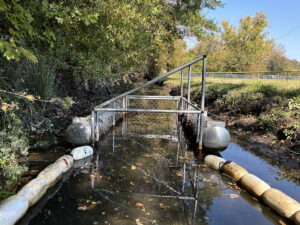News
Black History Month: celebrating the IBP slaughterhouse win
Posted on February 16th, 2023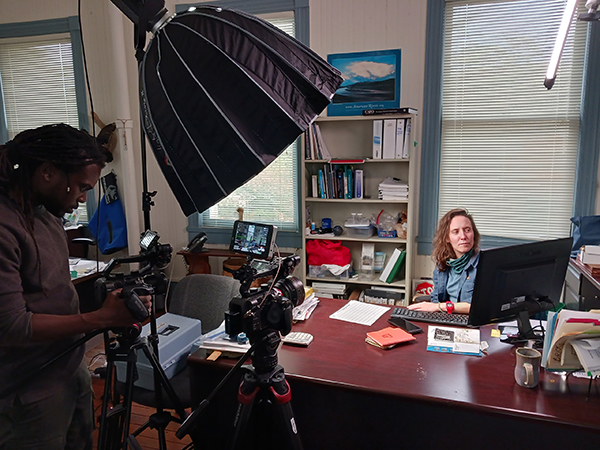
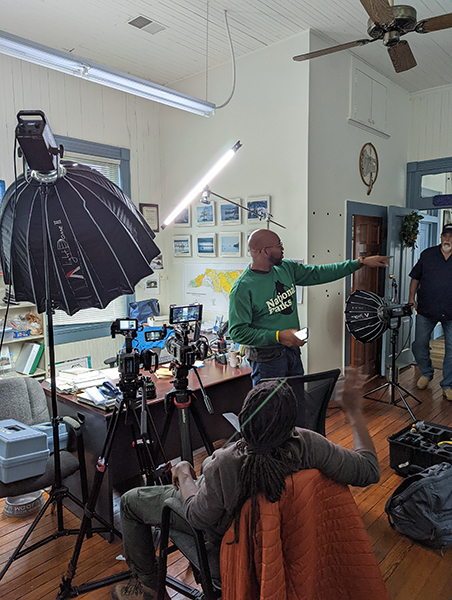
In celebration of Black History Month, Sound Rivers is sharing weekly opportunities throughout February to learn more about the fight for environmental justice and diversity inherent in environmentalism. This week, we’re highlighting a fight for environmental justice nearly three decades ago, when a community on the Tar River drew a line at a hog slaughterhouse moving in next door.
Edgecombe County wanted the industry, but the predominantly Black residents of Kingsboro did not. An IBP slaughterhouse operating 24 hours a day, seven days a week, would have brought tractor-trailer traffic rumbling through Rocky Mount and Tarboro at all hours of the day and night.
The group Citizens for Responsible Zoning was formed and its members and supporters attended public hearings, objecting to the issues such a project came with: zoning, water demand, waste discharge, in addition to low-paying jobs for the residents of Edgecombe County while the plant’s managers, and higher salaries, would be located in neighboring Nash County. The opposition was overwhelming; hearings had overflow crowds chanting “No IBP!”
What ultimately killed the project, according to retired Tarboro attorney Marvin Horton, was that slaughtering up to 20,000 hogs per day took a lot of water — turns out, two to three times the flow of the Tar River every day.

Decades later, the environmental justice win continues to be celebrated — now with the filming of “We Can Do Better,” a documentary about how a community came together to defeat environmental racism. Partnering on the film are the Phoenix Historical Society in Tarboro, East Carolina University Special Collections and Charlotte-based filmmaker Frederick Murphy with History Before Us.
Saturday, Pamlico-Tar Riverkeeper met up with the filmmakers at the Sound Rivers office in Washington to talk about Sound Rivers’ (then the Pamlico-Tar River Foundation) role in the IBP fight. Jill joined Duke University’s Clinical Professor of Law Ryke Longest, Waterkeeper Alliance’s Larry Baldwin and Don Cavellini, co-chairman of the Pitt County Coalition Against Racism and North Carolina Environmental Justice Network board member, as well as representatives from the Phoenix Historical Society and ECU.
“We were asked to be involved in the filming for a couple of reasons: when this fight was going on, PTRF was involved, and because the power of local activism and the success of this group of people fits into what we do — Sound Rivers’ mission and how we go about working on water-quality issues,” Jill said.
Jill said part of the filming centered around how an IBP slaughterhouse in Kingsboro would have impacted both the community and the Tar River.
“I enjoyed being a part of the filming, especially getting to learn more — through preparing for filming and from people in the room that day — about the IBP fight and its significance, as well as being part of a project that documents it in a way that people will be able to learn from,” Jill said.
Related News
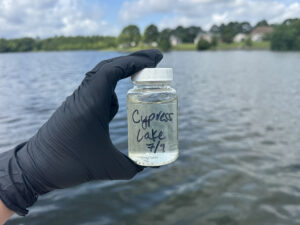
Specialist investigates lake connection to mysterious skin rash
July 10th 2025

Riverkeeper: Central NC flooding part of a much larger issue
July 10th 2025

N.C. Governor vetoes bad rulemaking bill
July 10th 2025

Riverkeeper, program director ‘Growing More than Rain Gardens’
July 10th 2025

Volunteer coordinator goes ‘fishing’
July 10th 2025

Neuse fish kill expected to extend beyond holiday weekend
July 3rd 2025
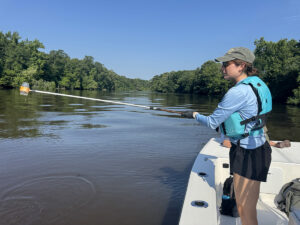
Swim Guide fails prompt Maple Cypress investigation
July 3rd 2025

Riverkeeper, town partners root out source of Smithfield sediment pollution
July 3rd 2025
